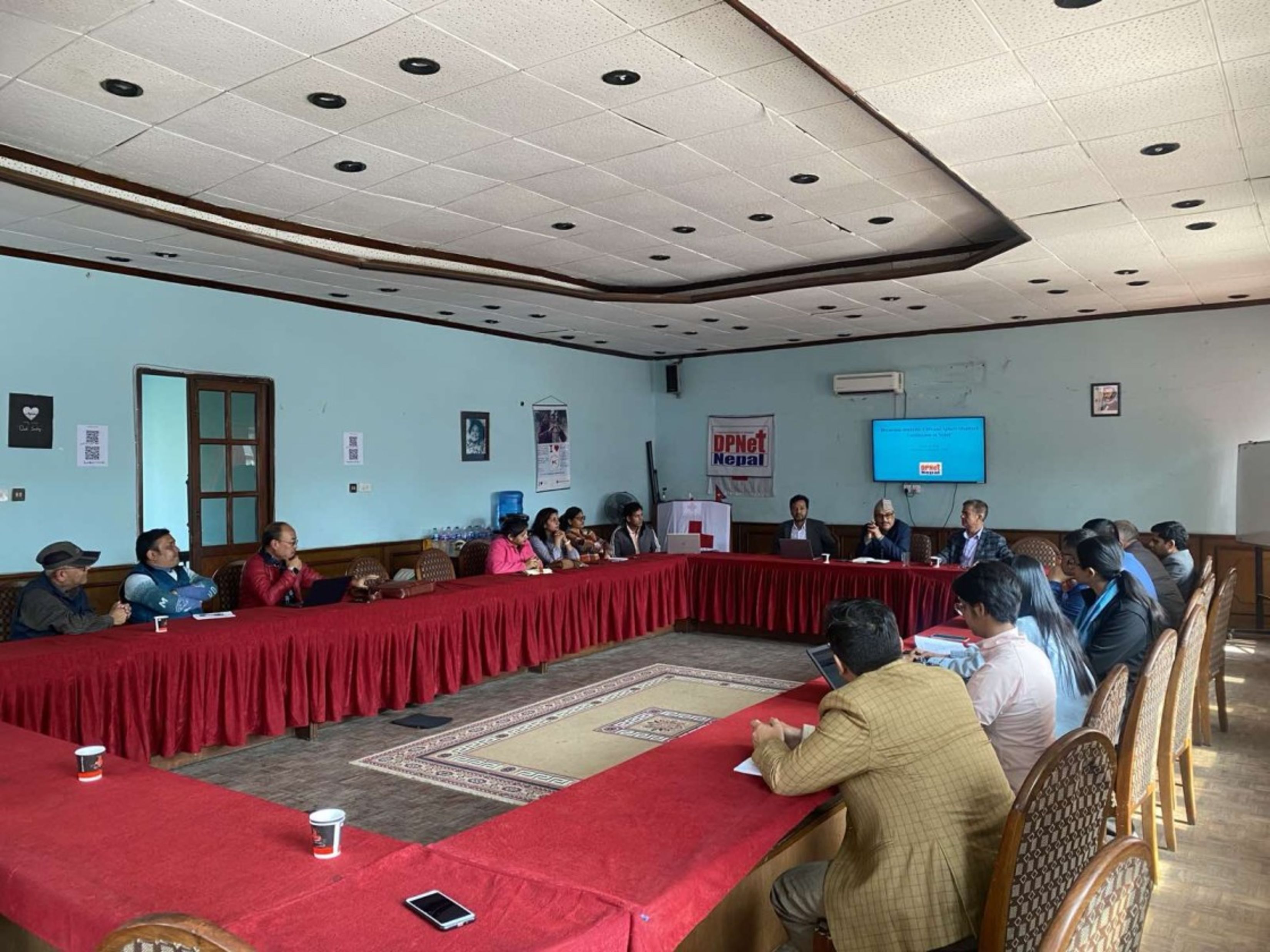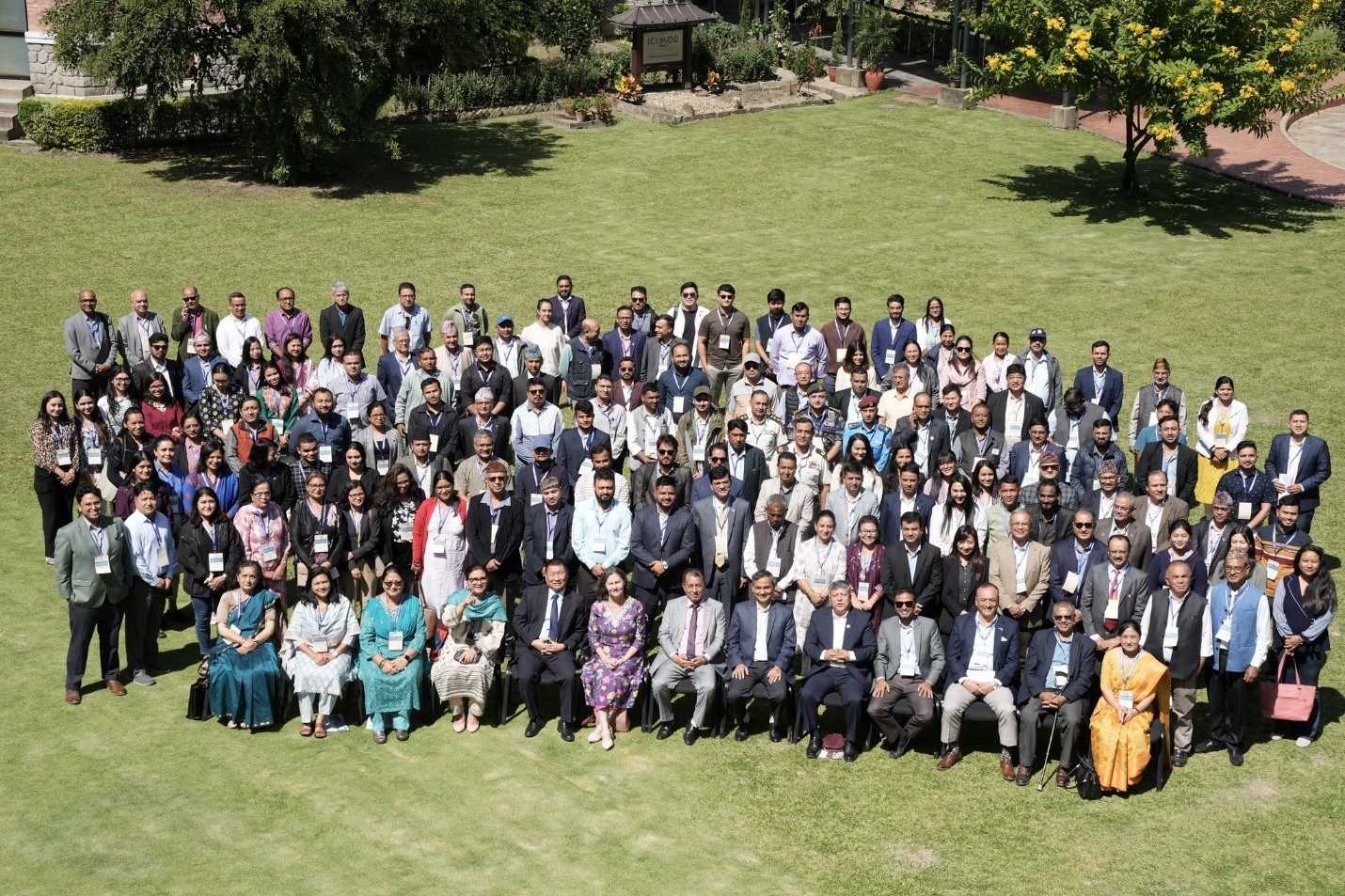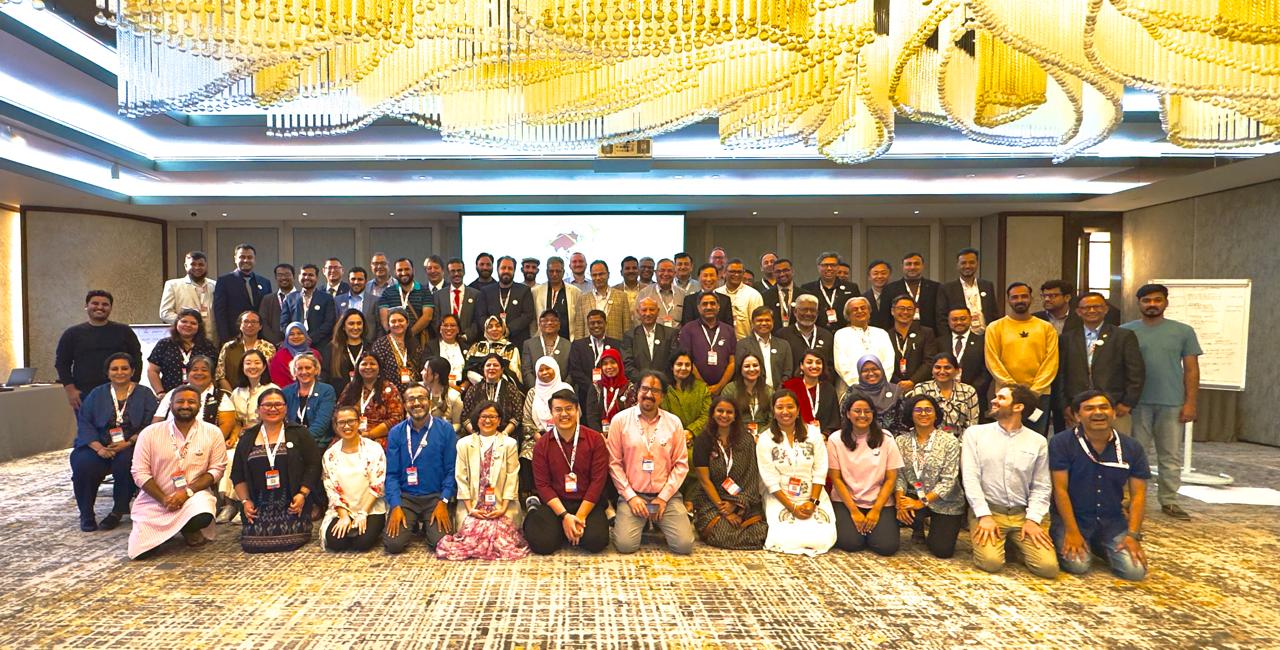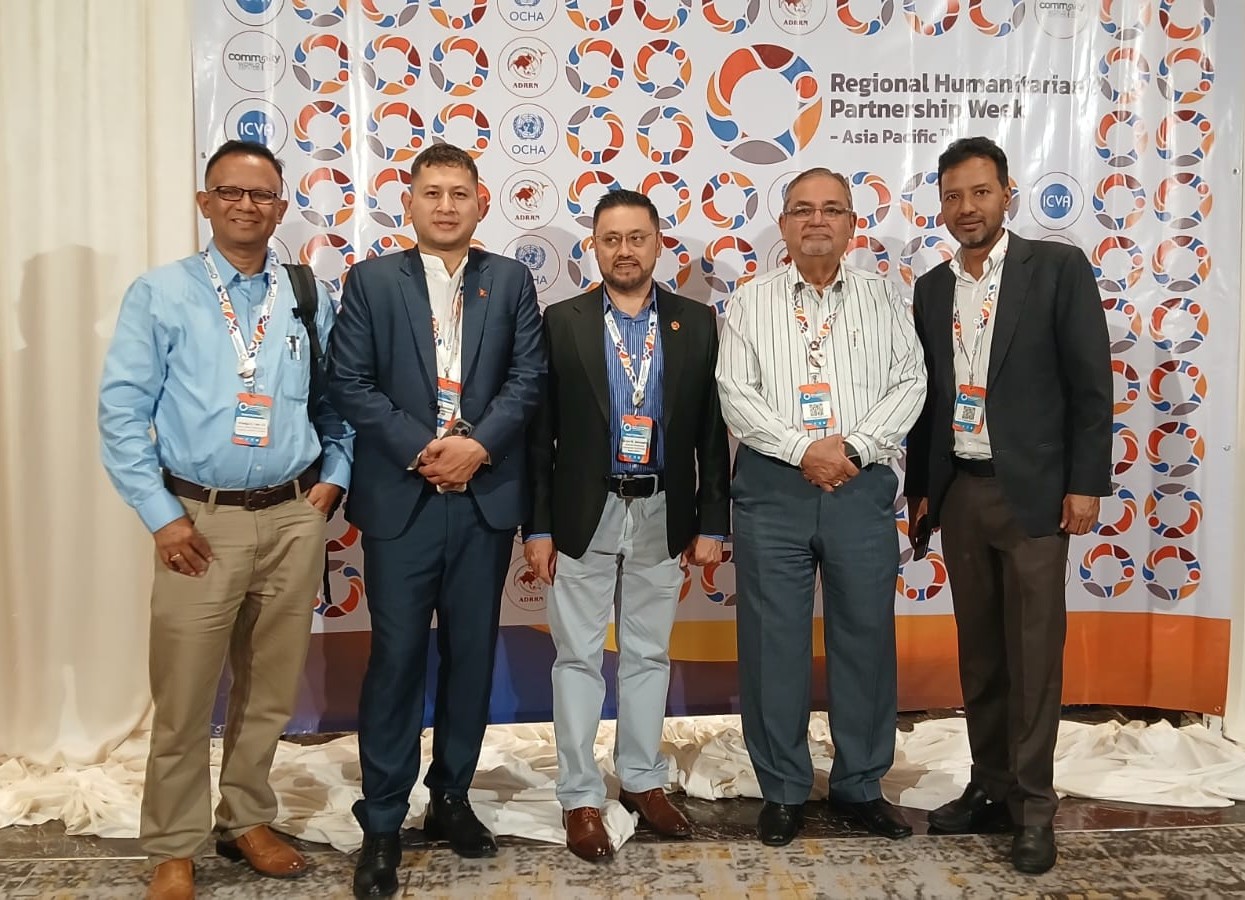Discussion on Revised CHS and Sphere Standard Localization in Nepal

March 11, 2024 - DPNet Nepal organized a significant discussion session focusing on the CHS and Sphere Standard Localization in Nepal. Mr. Surya Bahadur Thapa, Chair of DPNet Nepal chaired the program, which was attended by distinguished guests such as Mr. Kedar Neupane, Former Secretary of the Government of Nepal, and the representatives from stakeholder organizations with a long history of working in the humanitarian sector.
Mr. Surya Bahadur Thapa thanked the participants for their valuable presence with a warm welcome to all and provided them with a brief introduction to the CHS and Sphere localization in Nepal, and highlighted DPNet Nepal being the Sphere focal point in Nepal with Dr. Thapa as the coordinator. He briefed the aim of the discussion to learn and share the experiences of sphere localization in Nepal, the revision of CHS and to seek ways forward for effective implementation of the revised CHS.
Dr. Raju Thapa, Vice Chair at DPNet Nepal shared his presentation and highlighted the significant steps made in the institutionalization and localization process of Sphere standards in Nepal. He emphasized DPNet's key role as the Focal Point of Sphere Geneva in Nepal, facilitating coordination among 136 member organizations, including NGOs, INGOs, and UN agencies. Under the leadership of DPNet Nepal, a dedicated unit undertook the translation of Sphere standards into Nepali and led the dissemination of companion standards.
Dr. Thapa added that, through collaborative efforts with stakeholders, including the central government, DPNet successfully advocated for the incorporation of Sphere standards into the training curriculum of all 753 local governments. He emphasized the tangible outcomes of the efforts, including the production of educational materials such as the Sphere Handbook and a comprehensive training manual. Sensitization programs at the provincial level, including the production of Sphere-themed drama and folk songs, further solidified understanding and acceptance of Sphere standards.
As a result of these initiatives, the representatives of all the 753 local levels in Nepal are now sensitized to Sphere standards, equipped with hard copy reference materials, and have a uniform understanding of minimum humanitarian standard. He commended the collaborative efforts of all stakeholders in achieving these milestones, signaling a significant step forward in disaster risk reduction and humanitarian response in Nepal. He further highlighted the contribution to CHS revision made by DPNet Nepal as a sphere focal point of Sphere Geneva via the conduction of revision discussion sessions with Nepal stakeholders, and online discussion platforms to seek ideas to consider during the updated version of the CHS.
Mr. Ram Gurung, Technical advisor at DPNet Nepal provided an insightful overview of the revised Core Humanitarian Standard (CHS) in 2024, a crucial framework for the humanitarian community. The CHS, initially introduced in 2014, has undergone significant revisions to enhance its effectiveness and relevance throughout evolving global challenges.
During the presentation, Mr. Gurung highlighted the fundamental role of the CHS in setting a core standard of accountability within the humanitarian sector. He emphasized its guidance in designing principled and high-quality assistance, ensuring alignment with the needs and rights of affected people and communities. He clarified that the revision process was driven by various factors, including shifts in the global context such as the climate emergency and the COVID-19 pandemic. Additionally, policy environment changes and lessons learned from past experiences necessitated updating the standard to address emerging realities effectively. The revision timeline outlined a thorough consultation process, spanning from May 2022 to December 2023. Stakeholders participated in multiple rounds of feedback sessions, webinars, and workshops, culminating in the final draft of the updated CHS shared with stakeholders in December 2023.
Mr. Gurung outlined the key changes to the CHS in 2024. Firstly, there was a reinforced focus on placing people at the center of quality and accountability efforts. The structure of the standard was also simplified, with a streamlined format comprising nine commitments and supporting requirements. Moreover, efforts were made to ensure the accessibility of the standard to a broader range of organizations and individuals involved in humanitarian efforts.
Notable changes included the division of Commitment 3 into two distinct commitments, emphasizing local leadership and sustainability, and focusing on the consequences and risks of assistance for people and the environment. He further added that; The rollout of the updated CHS is announced for March 21, 2024, 16.00-17.00 CET with an event scheduled to take place online and in person in Geneva. This event aims to underscore the commitment to people-centered accountability and to facilitate broader engagement with stakeholders. The launch of the revised CHS aims to mark a significant milestone in the humanitarian community’s ongoing efforts to advocate quality and accountability in aid delivery, reflecting the evolving needs and priorities of those affected by crises worldwide. The registration link for online participation is https://regi.page/CHS24 and the registration for in-person attendance can be done via https://www.icvanetwork.org/events/icva-2024-annual-conference/.
He further noted that Western Nepal is forward in terms of awareness and standard program implementation. Therefore, programs should be designed for other parts of Nepal to achieve balance and uniformity with the country’s overall development trajectory being based on the sphere standards.
After Mr. Gurung's presentation Dr. Thapa came up with interesting Nepali idiomatic expressions to summarize the revised CHS; “My participation, my rights” represents the 1st criterion presenting the need for humanitarian response to be relevant and appropriate, “Dies today, receives medicine tomorrow”; this idiom attempts to emphasize the importance of the 2nd criterion of the CHS that the humanitarian response should be timely and effective. Similarly, the idiom “Prepare to kill a lion even if you’re chasing a wolf” brings to light the 3rd criterion that underscores the role of humanitarian response in strengthening local capacities and avoiding negative effects. The idiom “To be on the same wavelength” in the context of CHS depicts the importance of the 4th criterion that internalized the significance of communication, participation, and feedback during humanitarian actions. “Beneficiaries’ feedback is as valuable as a schoolbook” is the idiomatic representation of the 5th criterion which means that complaints on humanitarian efforts should always be welcomed and addressed for effective humanitarian practice. “Everyone wants coordination, but no one wants to be coordinated; understand the importance of coordination” depicting the essence of the 6th criterion that highlights the importance of effective coordination. The idiomatic expression “One unwilling to learn ages in youth” highlights the 7th criterion which focuses on the need for continuous learning and application of the learning into practice. “Smile with your teeth when words fail; a crucial trait for any employee”; this idiom explains the 8th criterion which concentrates on staff competency, and the idiom “A small hole sinks a ship; accountability is for one’s own good” presents the 9th criterion of the CHS which emphasizes the importance of beneficiaries’ accountability.
Open Floor Discussion:
Mr. Bishnu Timalsina, DiMANN emphasized the need for distinction between responsibility and accountability, concerning whether both terms convey similar meanings or not in humanitarian response.
Mr. Shyam Sundar Jnavaly, NDRC provided a clear overview of the difference between responsibility and accountability and added that accountability is a broader term that depicts the act of being answerable for the responsibility one exhibits. He articulated a vision where, during the process of organization registration and renewal, the SWC should take the lead to evaluate the organizations that commit to following Sphere and CHS principles and further emphasized the need to make the revised CHS disability inclusive and friendly for effective localization practice. Mr. Janavaly further recommended a National level initiation on behalf of the global launch of CHS revision as an effort to internalize the change made in the humanitarian standards to enhance better practices.
Mr. Ganesh K. Jimee, NSET emphasized that at the local level, there is a misconception that only humanitarian organizations are required to adhere to the standards and guidelines during humanitarian crises. It is crucial for all local entities, including government, semi-government, and non-governmental organizations, to be aware that these standards must be followed by everyone. For Sphere and the Core Humanitarian Standard (CHS), there is a pressing need for national-level localization provisions.
Ms. Amika Rajthala, DJN highlighted the importance of coordinating and collaborating with the media sector as it is a strong platform to disseminate information and raise awareness of the context and importance of Sphere and CHS in disaster management.
Mr. Navin Dahal, a Freelancer shared his experience of working in the humanitarian sector during the Pariwartan project of UNIOM worked on the localization of the humanitarian standards and emphasized the need for ensuring the progressive localization process keeping the importance the local differences such as language, and context.
Dr. Gaurav Devkota, WHO highlighted the need for a separate legal entity to look after the evaluation and quality assurance of the humanitarian actors and implementation of the sphere standards. He further advocated for the need for quality outcomes rather than being focused only on activity.
Ms. Dev Kumari Parajuli, NDWA mentioned that after the aftermath of the 2015 Gorkha earthquake, the concept of inclusion has rapidly gained attention. However, the practical implementation of inclusion is still progressing slowly. There is a need to follow a need-based approach rather than a blanket approach, especially in the case of persons with disabilities.
Mr. Kedar Neupane, Former Secretary of the Government of Nepal summarized the session highlighting the need for dynamic efforts in the dissemination of information and awareness regarding Sphere and its standards in Nepal. He raised a concern regarding the flexibility to modify the sphere standards in the local context and highlighted the need to seek context-based adoption of the CHS in Nepal considering its geographical, cultural, and individual diversity focusing on inclusive practice. He further emphasized the need to balance the demand and supply and suggested piloting to understand the local-level needs considering barriers and gaps to localize and sensitize at the ground level. In addition, he also recommended preparing a synopsis of the handbook rather than distributing bulky books as an effective means to ensure information reach.
Mr. Surya Bahadur Thapa, Chair at DPNet Nepal and Session Chair concluded the discussion by highlighting the efforts made by DPNet in translating and disseminating the sphere handbook in Nepal, Bhutan, and Myanmar. He summarized the session by underlining the need for an inclusive approach to sphere standard dissemination and localization and the need to seek ways to adopt the standards being region-specific and context-based for better outcomes.











